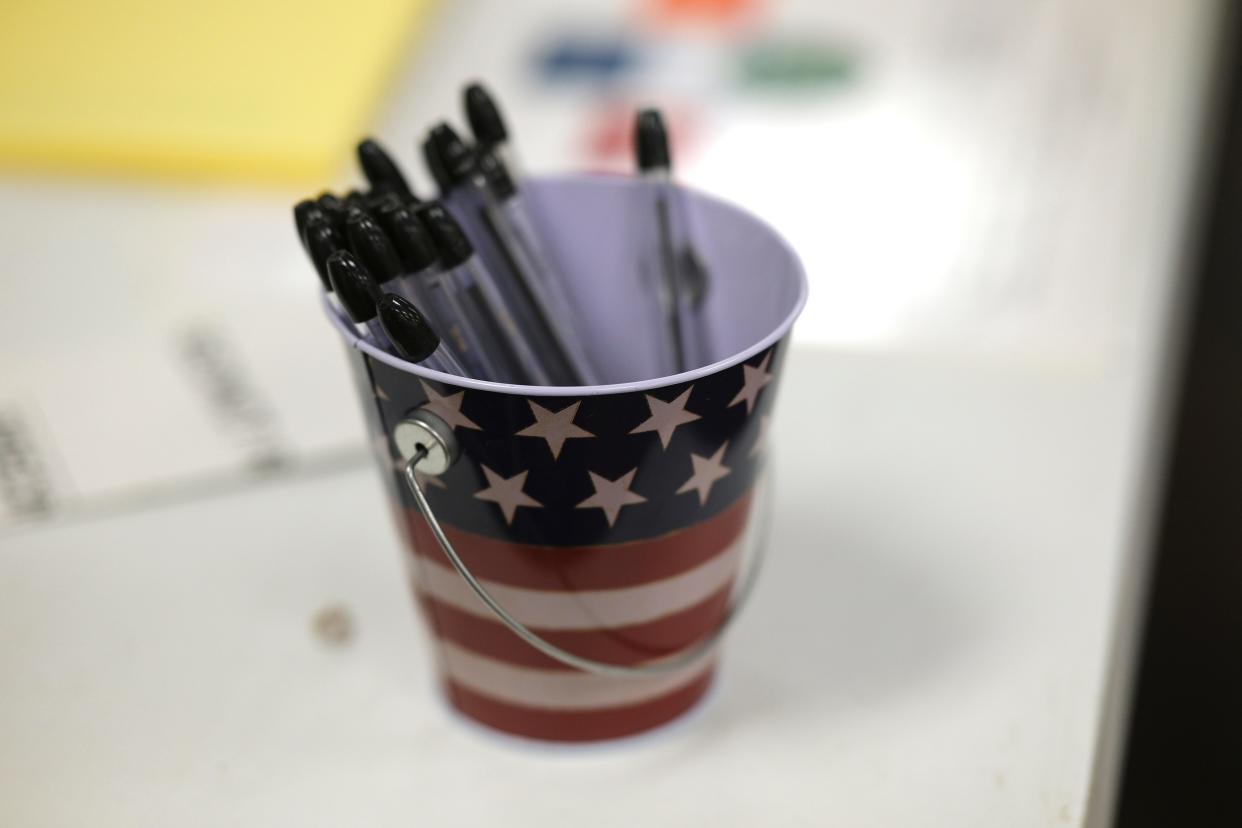Gov. Stitt task force calls for changing campaign donation limits

- Oops!Something went wrong.Please try again later.
A task force created by Gov. Kevin Stitt is calling for no limits on how much money state politicians can accept from individuals in campaign donations.
The Governor's Task Force on Campaign Finance and Election Threats reported a change is needed to combat the impact of dark money groups.
"Independent expenditure entities are allowed to raise anonymously unlimited amounts of money where candidates and political parties may not," the task force said in its March 31 report. "Candidates, not independent expenditures, should run races."
A candidate currently can accept $3,300 per individual per election in Oklahoma. The limit means a candidate could get up to $9,900 per individual if on the ballot in a primary, a runoff and the general elections.
A small number of states have rule similar to Gov. Kevin Stitt's proposal
Fewer than a dozen states have no limits on individual donations. They include Texas, Iowa, Nebraska, Utah and Virginia, according to the National Conference of State Legislatures. Any change in Oklahoma would require action by the state's Ethics Commission.
The governor created the task force on Nov. 1.
"I am proud to report that Oklahoma is a national leader in election security. Our state and county election boards are best in class," Stitt said in an executive order. "Oklahomans should know the ballots cast and counted in Oklahoma are legitimate. But we must not rest on our laurels."
The task force reported it confirmed "that our election system is one of the best ... in the nation." It pointed out voting machines cannot connect to the internet and have built-in features that prevent tampering.
It pointed to two key 2022 races in justifying a change on donation limits.
More: A group formed by one candidate’s husband is buying ads in Tulsa school board races
In a reference to the governor's race, it reported "independent expenditures had a 4 to 1 spending advantage against the candidate that was opposed." Stitt's campaign complained in 2022 that dark money groups had spent "upwards of $50 million to lie" about him. Stitt has reported spending more than $10 million on his reelection effort.
In a reference to the state auditor's race, the task force reported independent expenditure groups spent in excess of $500,000 in support of a candidate who spent less than $2,500 himself on his campaign.
Two political action committees spent more than $500,000 in support of a political newcomer, Steve McQuillen, in the Republican primary for state auditor. McQuillen reported spending $2,350.
The state auditor, Cindy Byrd, won reelection despite the massive spending in support of McQuillen. She accused the co-founders of Epic Charter Schools of funding the two PACS in retaliation for a critical investigative audit by her office. She said McQuillen was their "strawman."
Federal Election Commission records later showed the two PACS had received $581,000 from the Protect Our Freedoms PAC. The Epic Charter Schools co-founders, Ben Harris and David Chaney, gave $375,000 each to Protect Our Freedoms PAC in June 2022.
Both now face a criminal case as a result of the 2020 audit and further work by the Oklahoma State Bureau of Investigation.
Other recommendations from the task force
Chairing the nine-member task force was A.J. Ferate, an attorney and the past chairman of the Oklahoma Republican Party. Also on the task force was Paul Ziriax, secretary of the Oklahoma State Election Board.
The task force also recommended:
Legislators amend state law to make mandatory random audits of voting results after each election.
Rank-choice voting be banned because of issues elsewhere that have sown distrust in election results.
Legislators ensure state laws are sufficient to protect campaigns, elections and the public from "artificial intelligence" technology.
The Ethics Commission create new disclosure rules because of the rise of AI-deep fakes in campaigns.
Legislators make foreign expenditures in campaigns a felony.
The Ethics Commission require treasurers of independent expenditure groups to personally certify that no campaign funds came from foreign sources.
No limits on how much political parties can donate directly to candidates.
An increase to $15,000 how much PACS, tribes, and limited liability companies can give to candidates every election cycle.
Allowing candidates to accept up to $200 without naming the donor on campaign reports to encourage involvement in campaigns without fear of adverse impacts. Candidates now must make public all donations over $50.
The state Election Board work with tribal authorities to keep felons from voting.
The Ethics Commission reassert its regulatory authority over county and local races or turn it over to district attorneys.
The task force also was critical of so-called "jungle" primaries where every candidate regardless of party is on the same ballot. It reported "primaries were designed for political parties to advance a particular nominee to the general election for consideration against the nominee of other political parties."
It complained "jungle" primaries elsewhere have resulted in general elections with two candidates of the same party on the ballot. "Such a primary system can have the effect of reducing options for voters despite its intent, and any unintended consequences should therefore be cautiously contemplated before it is instituted in Oklahoma."
This article originally appeared on Oklahoman: Stitt's task force calls for no limits on individual campaign donations

